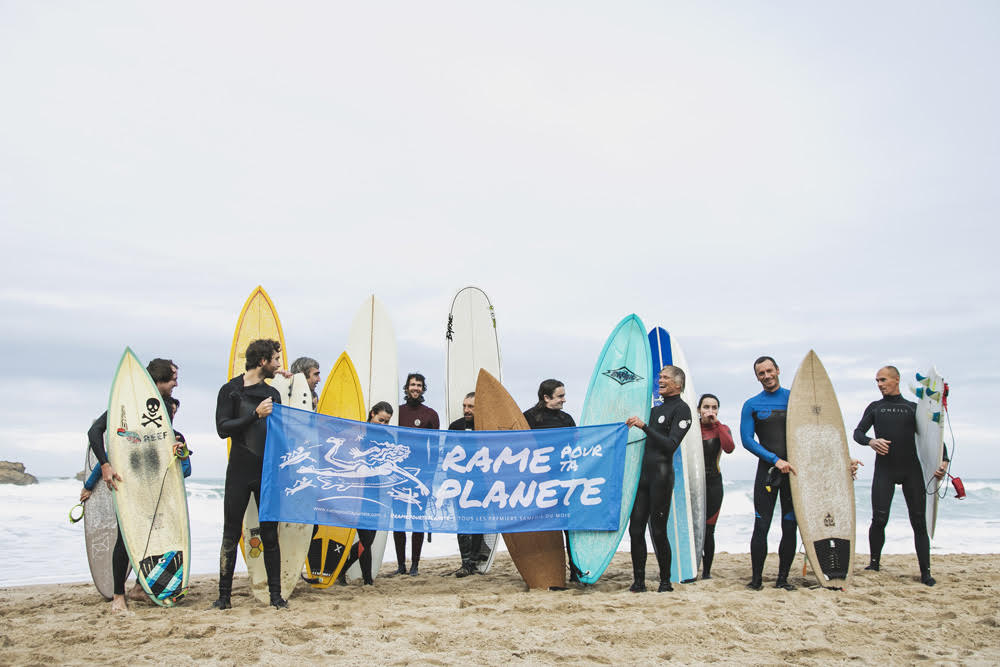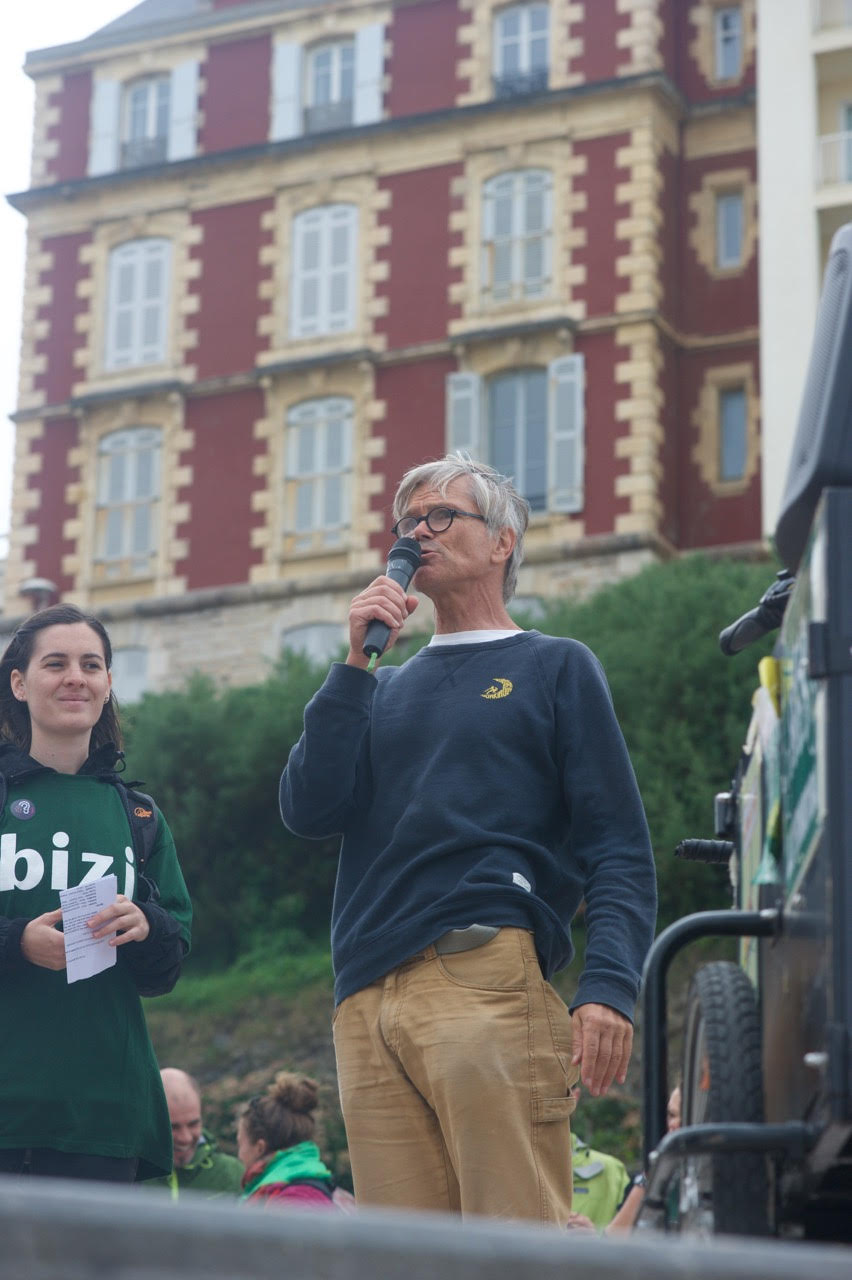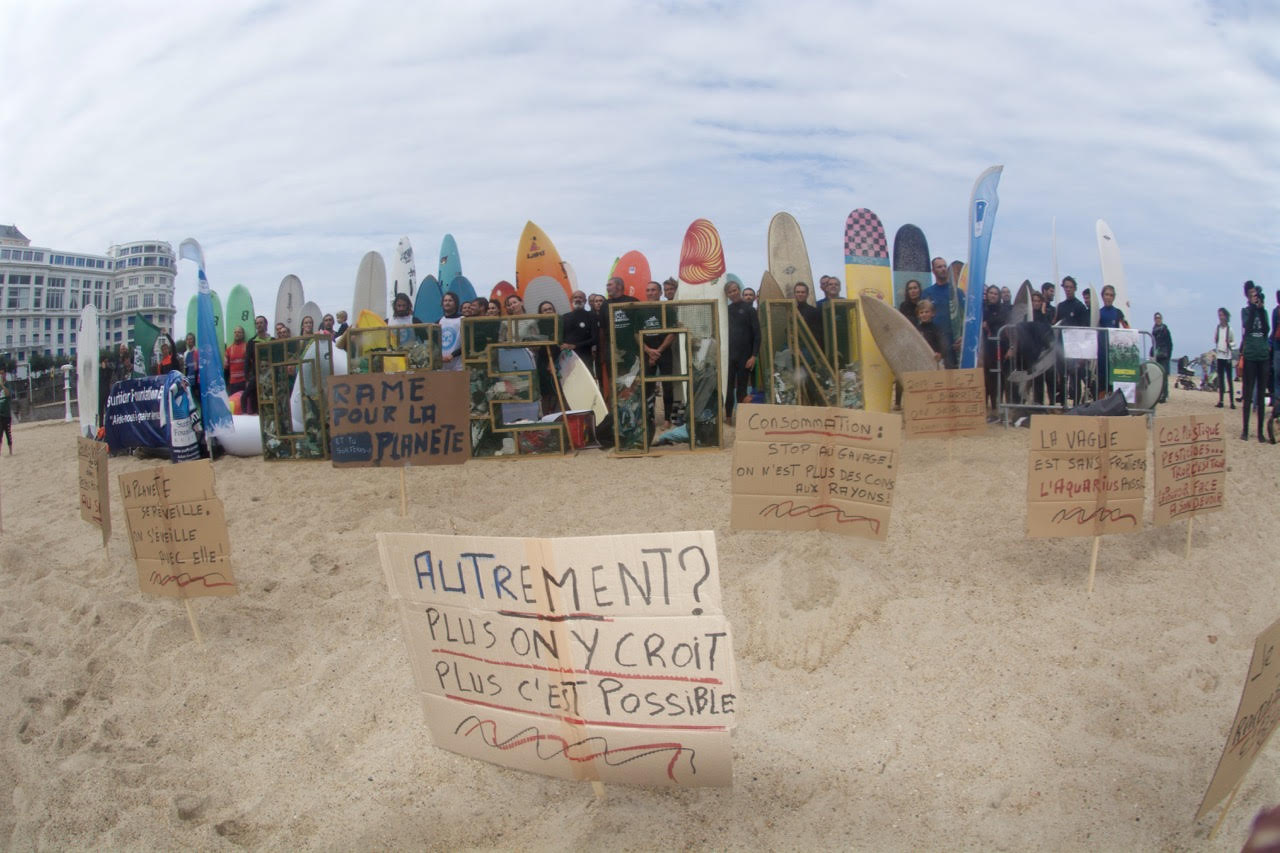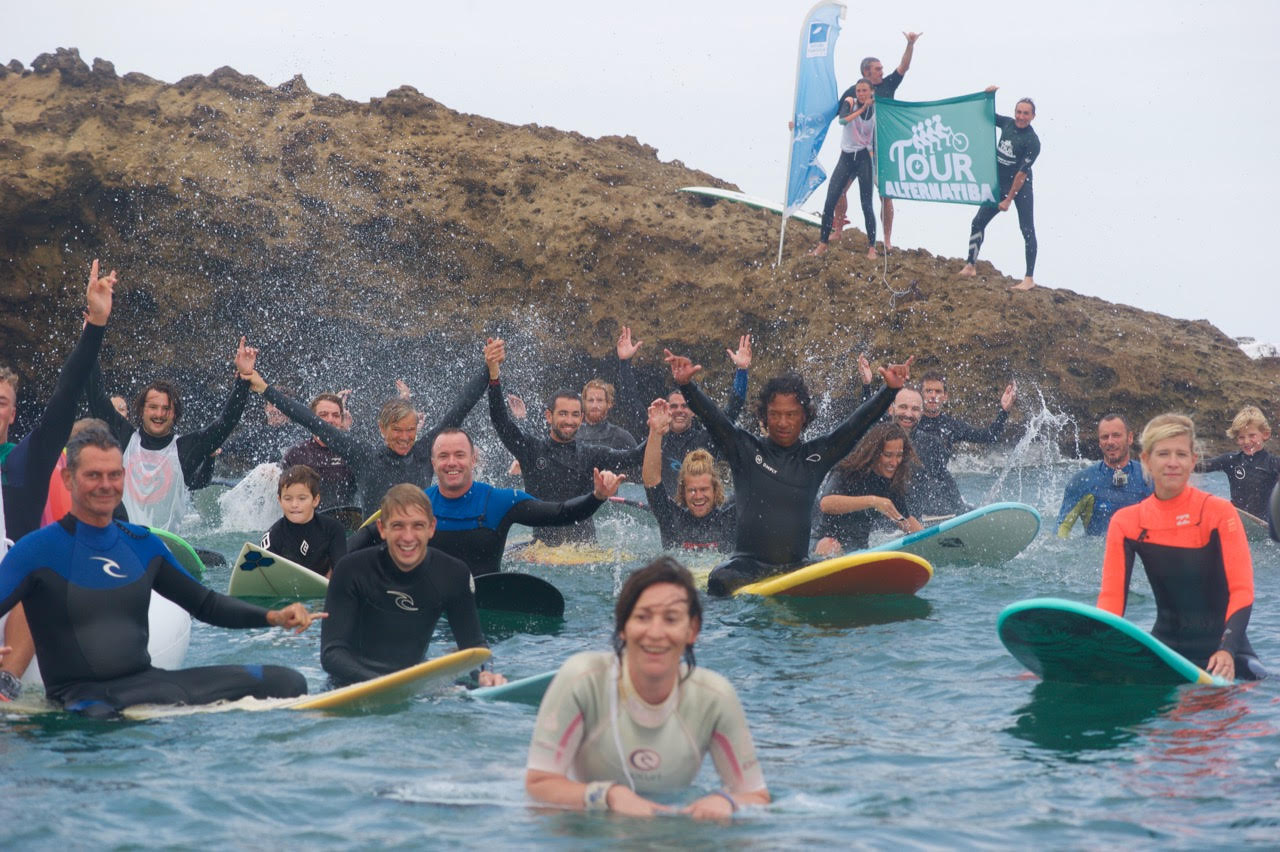Paddling for the planet

You may have heard stories of buddhist monks who congregate in large groups, sit cross-legged for hours on end and pray for Peace. How does that make the world a better place you may ask? Now a group of French surfers brave the freezing ocean every month and go out paddling ‘for the planet’. Has the world gone mad or do they know something we don’t? We talk to Gibus de Soultrait about the rich history of surf activism and how ‘Rame pour ta Planète’ came to be.
2018 was the beginning of the end: UN scientists warned we had 12 years left to limit the catastrophic effects of climate change. In the UK, Extinction Rebellion was born under the banner ‘We are f***ed -maybe- 😀’ (smiley included) and created a mass civil disobedience movement. In Sweden, 15-year-old Greta Thunberg skipped school in protest and ended up with a platform at COP24, chastising world leaders for their inaction. In Australia, school children went on strike and created a national debate on climate change. Unfortunately, surfers haven’t been as vocal. Until now.
‘Rame pour ta Planète’ was born in France in October 2018. Alternatiba, a Basque climate change initiative, had organized a (cycling) Tour de France around the time of COP21 to raise awareness on the issue. Last Spring, they asked Surfrider Foundation Europe to join them. On the 6th of October 2018, as the Tour’s cyclists were arriving into Biarritz for their finish in Bayonne, surfers joined forces and paddled out. They could have left it at that, but decided to make it a regular occurrence. They now meet every first Saturday of the month on the beaches in and around Biarritz.
“Surfrider Europe has been instrumental in the fight against ocean pollution, from sewage to plastic, fostering citizen and political action”
Gibus de Soultrait is a key figure of the French surf scene and veteran ocean protection activist. Before he got involved in ‘Rame pour ta Planète’, he co-founded Surf Session, the first French surf magazine (1986) and now runs the French edition of the legendary Surfer’s Journal. Together with Tom Curren and a couple of other surfers, he set up Surfrider Foundation Europe in 1990.
“I met Tom through his first wife. Together with a couple of other surfers we organised a pro contest in Spain to raise funds for an environmental organisation, ‘Planet Surf Initiative”. Many CT surfers came but as the ocean stayed flat during the contest period, we ended up spending 3 days talking about environmental awareness. As there were some reps from Surfrider Foundation (created in California in 1984), we decided to change our name from ‘Planet Surf Initiative’ to ‘Surfrider Foundation Europe’, an independent entity that would carry a similar message in a bid to protect the ocean worldwide. I am very proud of what Surfrider Europe has achieved. Even though I left its management team in the mid-90s, I stayed very close and supported campaigns through Surf Session’s editorials. Surfrider Europe has been instrumental in the fight against ocean pollution, from sewage to plastic, fostering citizen and political action. For example, the recent EU Directive banning single use plastics by 2021 is the result of tireless lobbying from Surfrider and partner environmental initiatives.”
(About Surfer Magazine) “I was 13 then and did not speak English very well, but it made quite an impression on me, showing that surfing had to go hand in hand with the protection of the ocean”
As a child of the Seventies, Gibus was maybe destined to become an environmentalist.
Growing up in Guéthary, he started surfing early even though the surfboards were too heavy for him. “I’ve always enjoyed playing in the rolling waves. It felt home. Surfing was everything to our teen gang, it fitted right in with the ‘70s lifestyle: living simply, back to nature, flexing our freedom through surf trips, that’s where we found our stoke, our utopia”.
At the age of 13 he became ‘environmentally aware’: “Earth Day was born in 1970. John Severson (then editor of Surfer Magazine) took the decision to publish the Day’s full declaration in the mag’s editorial. I was 13 then and did not speak English very well, but it made quite an impression on me, showing that surfing had to go hand in hand with the protection of the ocean. Surfer Magazine later launched the monthly chronicle ‘Our Mother Ocean’ and Severson released Pacific Vibrations around the same time, a classic surf movie with a strong environmental message.”
Aged 17, Gibus went to Bali at a time when it wasn’t the surf mecca it has since become. “All this built my teenage awareness. I was not an activist, but I took part in environmental demonstrations. The underground culture of that time was open to such issues: the mainstream was just denying them, considering nature as an infinite reserve where you could take as much as you wanted. We see the consequences today: those who are vocal are not the idealists anymore but the scientists! It is time to give back, we have no other option.”
Gibus is conflicted about the track record of environmental NGOs and refuses to talk of ‘failure’.
“There is no failure, only a long continuous fight. If our modern civilization did not consider what was already said about the environment at the beginning of the ‘70s, it might be because humanity had others issues to solve. For example, in the ‘60s the use of pesticides was considered a saving grace to solve starvation. Now most people have food and we have to reconsider the use of pesticides and their negative impact. Despite Monsanto’s cynical strategy to make a profit out of this hesitation, things can’t go faster than people’s mindsets. A mass environmental awareness that affects people’s daily lives is a maturation process that takes decades. You have to consider that solving environmental issues requires a reduction of production and consumption. It is easier to remain blind to this fact than to struggle with contradictions! Right now, NGOs have to double efforts to improve their messaging. I really think people are ready to change”.
“I think it’s a shame that Kelly Slater had his audience focused on his surf toy, this wave pool that is fascinating but from another planet considering environmental issues affecting the ocean”
He is less guarded when talking about the surf industry itself and its poor record on environmental transparency and carbon footprint reduction.
“No doubt, my biggest regret! But surfers are more hedonistic than activists. As the money came in, surf companies enjoyed being capitalists and doing business. You can’t blame them, they just followed society’s rules. Now surfers are consumers like everybody else. As the surf business was still building its market (products, pro surfers, contests, media…) , environmental considerations were cast aside as too costly. But it’s worth studying Patagonia’s growth model, built on the provocative message “if you don’t need it, don’t buy it”. Patagonia has doubled its turnover since the 2008 economic crisis, with a strong environmental message, proving they don’t just sell but take action by improving their products and their environmental track record.
I also think it’s a shame that Kelly Slater had his audience focused on his surf toy, this wave pool that is fascinating but from another planet considering environmental issues affecting the ocean. Slater could have been a key figure supporting the scientists’ climate alert. With a priority on the wave pool it becomes difficult not to see other messaging as greenwashing. What a pity!”
By doing that gesture in your surf life, you thank the ocean for the enjoyment you had. You change your relationship with Nature.
So where does this leave us in 2019?
“Ecology is slowly overtaking the Economy. All market resources depend on Nature. Change will not happen in one day nor equally everywhere, but it will happen. You can say that people were first blind to the need for change, then they became afraid of the consequences change would have on their habits, then they were shy and didn’t want to be the first to drive change… it is work in progress.”
Our conversation then went something like this:
- “But Gibus, we haven’t got all day, we have 10 years at most!
- Forget the objective and the distance, just be present. Any situation is like a boat taking its momentum from the elements.
- What???! Why you going all Mr. Miyagi on me?
- You may be talking more than actually doing anything, but step by step you will face your own words and act.
- Gibus, I think we lost something in translation. How does paddling help fight climate change?
- Until recently, surfers would consider that trash on the beach was the responsibility of local towns, a way to remove themselves from any responsibility. Now surfers are increasingly picking up trash after their surf session. It won’t change ocean pollution, but by doing that gesture in your surf life, you thank the ocean for the enjoyment you had. You change your relationship with Nature. A shift that changes our modern view of development, when we take Nature into consideration. When you start considering others, you open the door to the idea of sharing… not just thinking of your own selfish enjoyment. And this in turn helps shape other people’s attitudes.
- Gotcha, now we’re talking! (Did I dream he said ‘be soft like water’?)”
’Rame pour ta Planète’ is like groundswell: deep and slow moving but fast and powerful when it hits its target. And ‘Rame’ has the G7 in its sights.
“Considering that Biarritz is an important international surf town and that it will host the G7 on August 24-26 2019, we decided to have a paddle every first Saturday of the month. The message is aimed at surfers, encouraging them to get involved. If you come every Saturday with your children with a concern for the planet in mind, it will be easier to change your daily habits at home: less waste, less plastic, less meat, more local bio products, more cycling… The IPCC report about climate change was a nightmare for a lot of people who don’t even experience Nature as surfers do. It is our responsibility as surfers to support the scientists’ alert: we do so with our paddling, pushing people and politicians to act. Paddling is also synonymous with perseverance.”
There is certainly something very cathartic and real about paddling in cold winter waters. In a way as Gibus said, it does bring it home: living in the now, acting one stroke at a time, one set at a time. Every surfer knows that arduous journey. And its rewards. Which explains why Gibus remains ultimately hopeful.
“When you go out surfing, even if it is onshore and mushy, you always hope to catch a good wave and spend a good moment. Most of the time, you come out with a smile on your face, even if you wiped out. As long as you are humble, you are hopeful. It works!”
Join on January 5 2019 in Guéthary and Guidel, and every first Saturday of the month!
‘Rame pour ta Planète’: website / Facebook
📷: 1,3,4,5: Rabejac&Hourcade for ‘Rame pour ta planète’; 2-Gibus de Soultrait
Chief Storyteller at Swellbound









